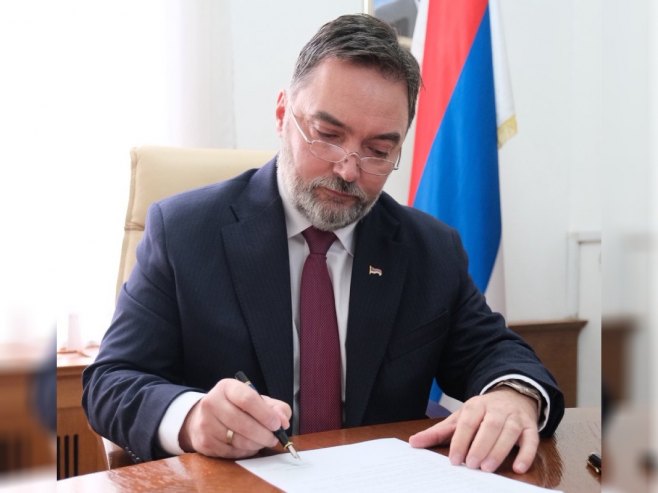Among the significant dates and events marking the creation and defense of Republika Srpska over the past three decades, November 21, 1995, holds a central place in our modern history. This is not only due to the symbolic spiritual significance of Aranđelovdan (the feast of St. Archangel Michael, bearing a spear and palm branch), but also due to the undeniable historical importance of the date when the Dayton Framework Agreement was concluded, writes Dragan Kalinić, former President of the National Assembly of Republika Srpska, in an op-ed for Provjereno.info.
The article is presented in full:
The agreement brought peace and stability, albeit temporarily, after one of the bloodiest wars in the Balkans, which plunged thousands of families, regardless of faith or ethnicity, into mourning. From this perspective, let us say—may it never happen again!
The agreement established a new constitutional structure in what was once referred to as “a small Yugoslavia” and defined Bosnia and Herzegovina as a confederal entity comprised of two entities and three constituent peoples.
Internal mechanisms were also incorporated to protect the interests of entities and nations, aiming to prevent any future domination of one group over others. Such domination had occurred in the early 1990s, leading to tragic consequences.
This newly established Bosnia and Herzegovina could be likened to a three-legged stool, where removing one leg (e.g., the Serbian leg) would cause it to collapse.
No matter how much the pro-Bosnian political elite strives, Bosnia cannot survive as a “bar stool” with one leg, where unitarists dictate when the lights in the “tavern” go on or off, so to speak.
It should not be forgotten that Serbian negotiators in Dayton reluctantly agreed to painful territorial concessions. They transferred part of Republika Srpska’s sovereignty (established as an independent and democratic state before the war) to the newly formed political entity of Bosnia and Herzegovina.
Aranđelovdan of 1995 was both a day of disappointment and a day of new hope for the Serb people on the tense Bosnian soil.
By coincidence, I was with the highest leadership of Republika Srpska at the time, awaiting final news from Dayton.
I witnessed disbelief and difficulty coming to terms with the fact that the peace agreement unjustly deprived the Serbs of ancestral homes in Sarajevo, parts of Krajina territories, the unresolved status of Brčko, and access to the sea near Goražde.
This overshadowed the joy of finally ending the war, having Republika Srpska internationally recognized, and retaining significant powers within a confederal, redefined Bosnia and Herzegovina.
The erosion of Dayton
Shortly after signing, a years-long erosion of the Dayton Agreement began.
This campaign continues today, represented by numerous dubious organizations and figures supported by anti-Serb Western administrations.
The culmination of this unconstitutional and unlawful practice came with an illegitimate High Representative who, throughout his tenure, has ignored the original text of the Dayton Agreement.
Now, there are claims that the original document cannot be found, having “disappeared” from the archives of Republika Srpska and Serbia.
This absence seemingly gives the High Representative free rein to impose his laws and, alongside at least two embassies in Sarajevo, introduce sanctions and legal proceedings against legitimately elected officials of Republika Srpska, most notably its President.
The fight to uphold Dayton
Thanks to the political struggle and resolve of Republika Srpska’s leadership, many actions contrary to Dayton have been halted—from efforts to integrate (abolish) the police to attempts to transfer entity property to the state level.
Foreign actors, with the help of local “healthy forces,” pursue these goals to fulfill their global plans for the Western Balkans before the inevitable establishment of a new geopolitical order, which I believe will happen soon.
It is clear that these efforts aim to satisfy the growing Muslim desire for a unitary, “their own state,” in exchange for ensuring “peace in Bosnia” in Europe.
These colonial administrators have, for years, exercised authoritarian control, seeking to create conditions far removed from the original Dayton Agreement.
Paradoxically, they label Republika Srpska and its leadership as destroyers of the Dayton Agreement, even though our leadership strictly adheres to its provisions and the constitutions of Republika Srpska and BiH.
We can only say this to them: Republika Srpska knows its path and has the human and material resources to remain self-sufficient. Our international friends, who understand the current situation, stand ready to support us in every way.
The legacy of Dayton
We understand why Muslims consider March 1, 1992 (when a Muslim-Croat coalition voted for Bosnia’s secession from Yugoslavia) more significant than November 21, 1995.
Serbs will never commemorate March 1, as it undeniably triggered the tragic war in Bosnia and Herzegovina.
Similarly, they continue to cling to November 25, the anniversary of ZAVNOBiH (the wartime assembly of Bosnia). They simply refuse to abandon their Communist delusions.
Croats, meanwhile, remain frustrated as the Washington Agreement forced them into the Muslim-Croat Federation against their will, leaving them politically constrained to this day.
Thus, each group will continue its own path for years to come. However, recognizing November 21 as a shared holiday could ease tensions in Bosnia and Herzegovina.
Until then, as with holidays, this gradual dissolution of Bosnia continues.
If political elites, especially Muslim ones, do not return to the original principles of Dayton, this dissolution will only extend to other, far more significant spheres. Memento!
Source: RTRS









